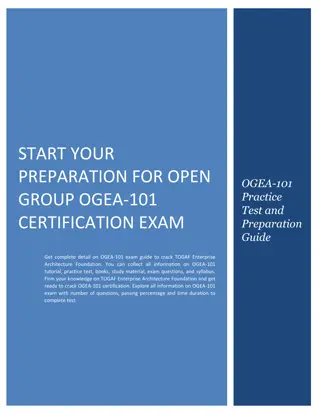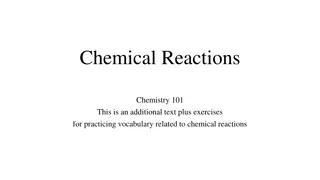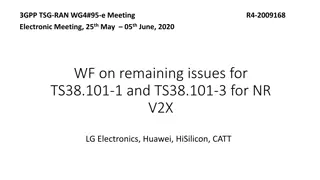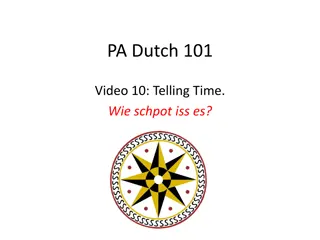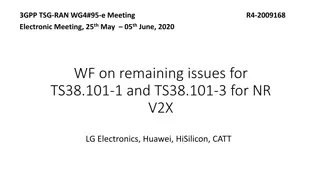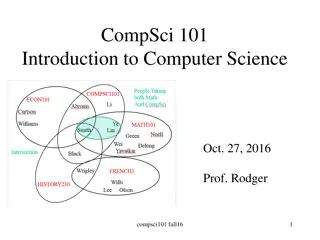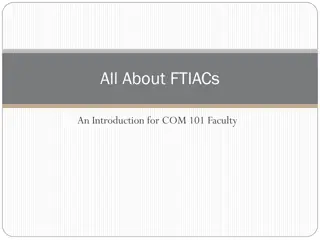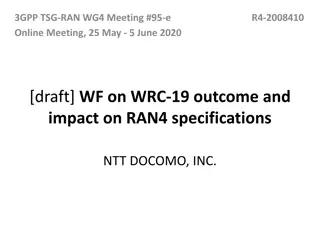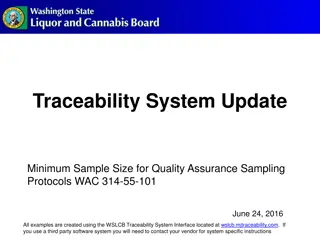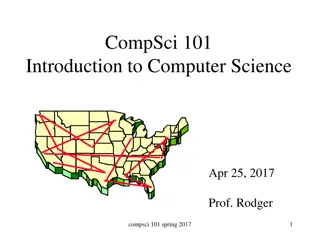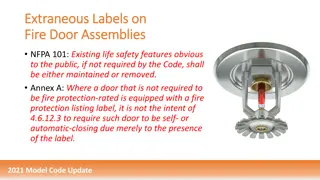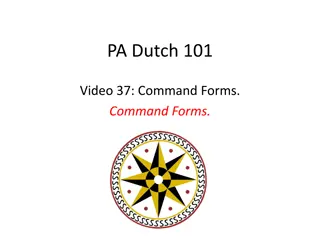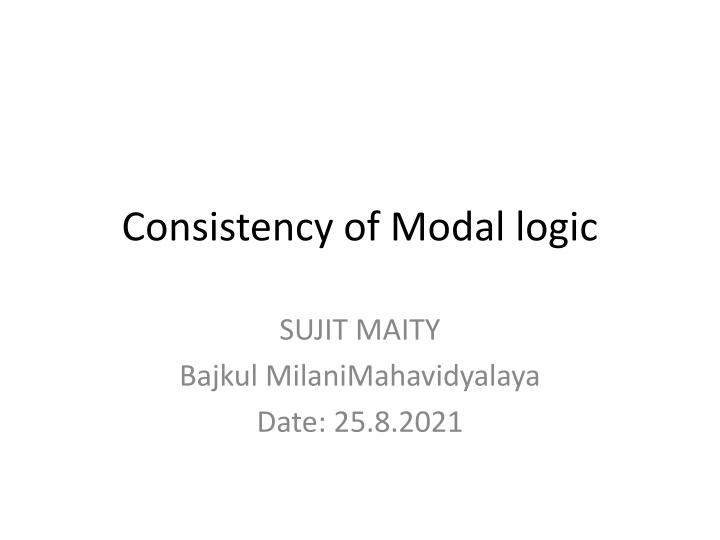
Modal Logic: Components, Importance, and Applications
Explore the world of modal logic, a branch of formal logic that deals with modalities, possible worlds, and axiomatic systems. Learn about its significance in philosophy and computer science, as well as its role in ensuring consistency and completeness in logical frameworks.
Download Presentation

Please find below an Image/Link to download the presentation.
The content on the website is provided AS IS for your information and personal use only. It may not be sold, licensed, or shared on other websites without obtaining consent from the author. If you encounter any issues during the download, it is possible that the publisher has removed the file from their server.
You are allowed to download the files provided on this website for personal or commercial use, subject to the condition that they are used lawfully. All files are the property of their respective owners.
The content on the website is provided AS IS for your information and personal use only. It may not be sold, licensed, or shared on other websites without obtaining consent from the author.
E N D
Presentation Transcript
Consistency of Modal logic SUJIT MAITY Bajkul MilaniMahavidyalaya Date: 25.8.2021
Introduction Modal logic is a branch of formal logic that deals with the study of modalities, which are expressions that indicate different modes or possibilities. It extends classical logic by introducing operators like "necessity" and "possibility" to reason about concepts such as truth, knowledge, belief, obligation, and time. In modal logic, propositions are evaluated not only for their truth value, but also for how they relate to different possible worlds or states of affairs. This allows modal logic to capture nuances and complexities that classical logic might overlook.
The key components of modal logic Modal Operators: Symbols like (possibility) are used to express modalities. Possible Worlds: Imaginary scenarios or states of affairs that represent different ways the world could be. Kripke Semantics: A introduced by Saul Kripke that defines the meaning of modal operators using possible worlds and relations between them. Axiomatic Systems: Sets of rules and axioms that formalize the behavior of modal operators, allowing for rigorous reasoning. (necessity) and model-theoretic approach
Importance in various fields: Philosophy Epistemology: Modal logic helps philosophers analyze concepts of knowledge, belief, and certainty by examining what is necessarily true or possible. Metaphysics: Modal logic provides tools to explore questions about the nature of reality, existence, and possible worlds. Ethics: Modal logic aids in discussing moral dilemmas and ethical principles that involve necessary or possible actions and consequences.
Consistency in Modal Logic: Definition A consistent logical system does not lead to contradictions or paradoxes, and its rules of inference and axioms conflicting conclusions. fundamental criterion for the reliability and validity of a logical framework, as it ensures that the conclusions derived from the system are logically sound and coherent. do Consistency not produce is a
Computer Science: Formal Verification: Modal logic is employed to verify the correctness of software and hardware systems by reasoning about possible states and behaviors. Model Checking: Modal logic is used to verify properties of finite-state systems, such as digital circuits and software programs, by exploring possible system behaviors. Temporal Reasoning: Modal logic assists in expressing and reasoning about time-dependent properties in systems, like scheduling and synchronization.
Artificial Intelligence: Knowledge Representation: Modal logic helps AI systems represent and reason about knowledge, beliefs, and uncertainty. Agent-Based Systems: modeling the behavior and decision-making of intelligent agents in complex environments. Semantic Web: Modal logic is used to describe and reason about resources and information in the Semantic Web. Modal logic enables relationships between
Relevant in modal logic Avoiding Paradoxes: Modal logic often deals with complex systems of statements involving modal operators like "necessity" and "possibility." Ensuring consistency helps prevent paradoxes and contradictions from arising within these systems. Inconsistent modal systems could lead to counterintuitive or nonsensical conclusions, undermining the usefulness of the logic. Soundness and Validity: Consistency is a prerequisite for soundness and validity in modal logic. A modal logical system is considered sound if every provable statement is true, and it is valid if the rules of inference preserve truth from premises to conclusions. Consistency ensures that these criteria are met, maintaining the logical integrity of the system.
Cont Reliable Reasoning: Inconsistent modal systems can lead to unreliable and unpredictable results. Consistency guarantees that the rules of modal logic allow for reliable reasoning, enabling accurate deductions and inferences about necessity, possibility, and other modalities. Meaningful Modal Operators: Consistency ensures that the modal operators have well-defined meanings and behaviors. If a system were inconsistent, the modal operators might lose their intended significance, making it difficult to reason coherently about modal concepts. Applications in Philosophy and AI: In philosophy, modal logic is used to explore concepts like necessity, possibility, and contingency. Consistency is essential for contradictory philosophical conclusions. Similarly, in artificial intelligence, consistent modal reasoning is crucial for representing and reasoning about knowledge, beliefs, actions, and plans. avoiding counterintuitive or
Consistent Modal Formulas: Consistent Modal Formulas involving Necessity: P Q (P Q) Consistent Modal Formulas involving Possibility: P Q (P Q) Consistent Modal Formulas with Quantifiers: x (P(x)) (It's necessary that for all x, P(x) holds.) x (P(x)) (It's possible that there exists an x for which P(x) holds.)
Inconsistent Modal Formulas: Inconsistent Modal Formulas involving Necessity: P P (Necessarily P is true, and necessarily P is false.) (P Q) ( P) (Necessarily both P and Q are true, and necessarily P is false.) Inconsistent Modal Formulas involving Possibility: P P (Possibly P is true, and possibly P is false.) (P Q) ( P) (Possibly either P or Q is true, and possibly P is false.) Inconsistent Modal Formulas with Quantifiers: x (P(x)) x ( P(x)) (Necessarily, everything is P, and necessarilythere exists an x for which P(x) holds.) x (P(x)) x ( P(x)) (Possibly, everything is P, and possibly everything is P.)


